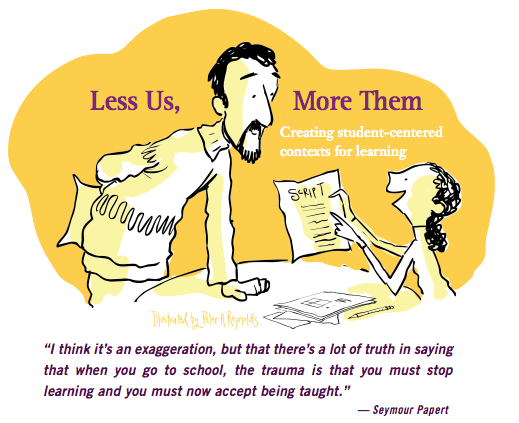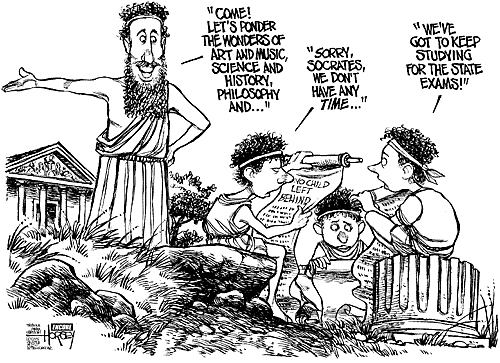digital media studio
Please have directions to the digital media studio
Digital Literacy for St. Cloud State University
Please have directions to the digital media studio
Prospect is a WordPress plugin. In an overly wordy sentence, Prospect is a domain-agnostic framework for data visualization in support of the digital humanities.
The concept is a simple one. We take data, and we represent it with images. We all get that part of it. The importance of that kind of work relies on the fact that we are humans, and we understand visual structures better and with more fidelity than we do tables of data.
Digital humanities isn’t just limited to the humanities – the design concepts that guide that field are relevant to all domains. At that level what we’re really talking about is a digital literacy, and one that will be instrumental in many of the possible futures that exist for our students.
Join us next Tuesday, November 10th from 12:00 PM to 1:00 PM, for a special SIG Series webinar: Tales from the National Forum on Active Learning Classrooms
The WSU Learning Spaces Team attended the National Forum on Active Learning Classrooms at the University of Minnesota – Twin Cities this summer and learned a lot. With topics ranging from picking whiteboards to better integrating classroom design into your campus strategic planning efforts, the conference was a treasure trove of good practices, pictures of cool new classrooms, links to useful information, and pro tips. Join us as we share what we learned at this amazing gathering. If you didn’t get a chance to go, this session will be a great opportunity to zoom in on the highlights. If you went, we would love to compare notes!
Ken Graetz, Tom Hill, Stephanie Stango, Dave Burman, and Eric Wright are all part of the Winona State University Learning Spaces Team and members of the Teaching, Learning, and Technology Services unit of Information Technology Services. They attended the National Forum as a team this summer and were able to cover almost all of the sessions. Each brings a unique perspective to the discussion, from under-the-hood classroom systems design and configuration to instructional design and pedagogical strategies.
Register for the webinar at http://www.eventbrite.com/o/minnesota-online-quality-initiative-7290950883. Please forward this on to anyone on your campus who might be interested.
Link to the Virtual Room:
https://moqi.zoom.us/j/672493176
Or join by phone:
+1 646 568 7788 (US Toll) or +1 415 762 9988 (US Toll)
Meeting ID: 672 493 176
FlexSpace. flexspace.org
CCUMC Leadership in Media and Academic Technology. http://www.ccumc.org
EduCause learning space rating system.
http://www.educause.edu/eli/initiatives/learning-space-rating-system
McGill Principles for Designing of Teaching and Learning Spaces has rubric
most useful technology in an ALC appears to be the whiteboard.
Whiteboards are also very glitchy. Projecting my tablet or laptop is just as effective–with less glitches
evidence that students are reluctant to engage in active learning.
the U has done work, but the “Canadians have the process”
the support faculty gets from technicians: two week in the beginning of the semester in a new classroom.
what is the most important goal of your college education and therefore of this course: a. inquiring information b. learning how to sue information and knowledge in anew situation c. developing skills to continue learning after college
GigaPan.com instructor will have students use in classes to identify problems engaging in a virtual field trip. student engagement
design thinking
wikispaces as GOogle docs, MS Word 16, work collaboratively
not group, but team. team work very important
take what we learned in ALCs to traditional large lecture halls
blending the formal with the informal (including outdoors)
connecting ALCs together across distance
thinking about gear (raised floors, smart kapp boards) http://smartkapp.com/
Adobe Connect Recording http://scsuconnect.stcloudstate.edu/p53yxcavsih/
online discussions with faculty from School of Education at St. Cloud State University, faculty and students from Plovdiv University and faculty from New Bulgarian University.
http://www.stcloudstate.edu/sped/faculty-staff.aspx
John Hoover: jhhoover@stcloudstate.edu – SCSU
Martin Lo: hlo@stcloudstate.edu – SCSU
Kyounghee Seo: kseo@stcloudstate.edu – SCSU
Galin Tzokov: g_tzokov@mail.bg, Gal.tzokov@gmail.com g – Plovdiv
zlaty.sh@gmail.comg – Plovdiv
Vladimira Angelova: vladiang@abv.bg – Plovdiv
Ludmil Duridanov : duridanov@gmail.com – NBU
Adobe Connect link: http://scsuconnect.stcloudstate.edu/ims/
Adobe Connect Recording from the December 10, 8AM (4PM local time in Bulgaria) with students and faculty from Plovdiv University and practitioners from K12 school in Plovdiv: http://scsuconnect.stcloudstate.edu/p20nzpx5g02/
online discussion with faculty, pre-service teachers and K12 teachers on the definitions and connection among these types of learning. Please share your questions and observations in the the comment section under the blog entry.
обучение в общности (community based learning), обучение базирано на проекти 9 project based learning ) и индивидуално обучение (personalized learning)
за краткото време от един час, ще се дискутираме дефинициите и връзката между три вида обучение, които са обект на внимание като част от реформата в американското обучение. Моля споделете мненията си и въпросите си в секцията за коментарии под блога
Constructivism: Lecture and project-based learning
http://www.swarthmore.edu/lang-center-civic-social-responsibility/community-based-learning-cbl
Community Based Learning (CBL) is a pedagogical approach that is based on the premise that the most profound learning often comes from experience that is supported by guidance, context-providing, foundational knowledge, and intellectual analysis.The opportunity for students to bring thoughtful knowledge and ideas based on personal observation and social interaction to a course’s themes and scholarly arguments brings depth to the learning experience for individuals and to the content of the course. The communities of which we are a part can benefit from the resources of our faculty and students, while the courses can be educationally transformative in powerful ways.
http://www.princeton.edu/cbli/
The Community-Based Learning Initiative (CBLI) connects students’ academic work with their interest in and concern for the communities around the University. Working with local nonprofits, students develop research projects, collect and analyze data, and share their results and conclusions, not just with their professors, but also with organizations and agencies that can make use of the information. Working with CBLI, students can do community-based research in courses, as a summer research internship, and as part of their junior paper or senior thesis.
Introduction to community based learning
http://academics.holycross.edu/files/cbl/Introduction_to_Community-Based_Learning.pdf
another form of experiential learning. Wide variation of definitions: off-campus academic learning or service learning. Field work, internships, community based research etc. connects classroom learning objectives with civic engagement.
https://en.wikipedia.org/wiki/Service-learning
Service-Learning must properly connect the traditional classroom experience with the real life lessons that come through service.
обучение базирано на проекти
Project-based learning is a dynamic classroom approach in which students actively explore real-world problems and challenges and acquire a deeper knowledge. http://www.edutopia.org/project-based-learning
https://www.pinterest.com/rxinsider/experiential-learning-service-learning-experientia/
https://www.youtube.com/watch?v=LMCZvGesRz8

http://www.learningreviews.com/Project-Based-Learning-Lesson-Plans.html
http://edglossary.org/personalized-learning/
http://www.personalizelearning.com/

обучение фокусирано около студента



Socratic method, also known as method of elenchus, elenctic method, or Socratic debate, is named after the classical Greek philosopher Socrates. It is a form of inquiry and discussion between individuals, based on asking and answering questions to stimulate critical thinking and to illuminate ideas.
https://en.wikipedia.org/wiki/Socratic_method

game-based learning differs from gamification in several important ways. Sometimes the latter is reduced to bells and whistles such as gold stars and progress bars, but gamification is potentially a much more subtle and powerful teaching strategy.
lizabeth Goins (Rochester Institute of Technology) describes several recent projects including a 3D game based on Hieronymous Bosch’s Garden of Earthly Delights in her blog, and details as well assignments in which the students create games. Keri Watson (University of Central Florida), teaches with both a RPG (role-playing game) and an ARG (alternative reality game). The RPG is Gretchen Kreahling McKay’s “Modernism versus Traditionalism: Art in Paris, 1888-89,” a Reacting to the Past (see earlier PH coverage) game, targeted for use in first year seminars at small liberal arts colleges. She taught with the game several times while at Ithaca College and reflects on her experience here. Watson’s ARG, “Secret Societies of the Avant-garde,” was createdwith a colleague in digital media as a Unity-based game, and is still in development. (Anastasia Salter wrote about this game in February.) Their prototype was deployed this past spring in an upper level modern art course, the game poses for the students a series of the challenges to research and create online exhibitions. (Those interested in developing an ARG might also want to peruse this interesting recent piece from TechCrunch on historical accuracy in games.)
http://www.edutopia.org/blog/face-to-face-vs-online-why-either-or-matt-levinson
Too often, adults assume the worst about kids’ online behavior instead of seeing the best. The facts are that teens know how to build community online — and they’re already doing it. A recent Pew survey of teens and online behavior (as reported by The New York Times) revealed:
57 percent of American teenagers age 13 to 17 say they have made a friend online. Nearly three in 10 of the teenagers surveyed said they had a network of more than five friends they had made through the internet. The vast majority, 77 percent, of these relationships don’t culminate in an actual meeting.
7 Stages of Development
There’s a clear path to online learning, matched with strong face-to-face interactions. Schools should be nimble enough to incorporate both modes of learning. And what does the path to successful digital learning look like? Here are the stages of development:
1. Clean up infrastructure.
2. Go 1:1.
3. Find the right LMS.
Gamification Mechanic Benefits Each gamification mechanic result in one or more benefits.
Gamification Personality Types
People are motivated to play games differently.
Explorers: Pride themselves in exploring all facets of a game or the context surrounding it.
Killers: Driven by player vs player competition. Always comparing themselves to others.
Socializer: Prefers to chat, play cooperatively, and share game experiences with others.
Achievers: Look to achieve all objectives available in a game. Desires to beat the game itself.
==========================
Adaptive learning systems provide each student with a personalized learning experience, adapting the presentation of the content, and possibly the assessment to the individual ability of the student
==============================================
=============================
=============================
slide 11: Two primary design goals supported through Data Visualization:
–What story is the data telling you
–Identify patterns and exceptions
–Compare, contrast, choose
–Explain, make a point, decide
slide 15:
qTo communicate
qPresent more clearly or more forcefully than would be accomplished with text or tables
qReports, dashboards, infographics, etc.
qTo discover
qAllow us to see what would be difficult or impossible to see if not presented in a useful visualization
qRealm of research but moving into the mainstream
qCan same visualization serve both purposes?
======================
========================
==============================
https://drive.google.com/file/d/0B4vcm8Bg5pkcWFlaQ1J3b3duc2M/view
5. Using small unmanned aerial vehicles today is similar to the “fair use” of media
http://www.dronesurvivalguide.org
Resources – Higher Ed Drone Policies
The Ohio State University
Iowa State University
Indiana University
University of Kansas
Penn State University
University of New Mexico
The Association of College and University Policy
Administrators (ACUPA, acupa.org)
===================
New electronic tattoos could help monitor health during normal daily activities.
http://www.technologyreview.com/news/512061/electronic-sensors-printed-directly-on-the-skin/
http://news.utexas.edu/2015/09/29/engineers-develop-new-method-for-making-wearable-electronics
http://www.theedadvocate.org/a-digital-future-k-12-technology-by-2018/
The recently-released New Media Consortium Horizon Report details six up-and-coming technologies in the next five years for K-12 classrooms.
Horizon #1: In the next year, or less.
Mobile learning. Cloud computing.
Horizon #2: Within two to three years.
Learning analytics. Open content.
Horizon #3: Within four to five years.
3D printing. Virtual laboratories.
Presented on the NMC K-12 Horizon Report over the weekend at the Alliance for International Education Conference held at Yew Chung International School of Shanghai: http://www.slideshare.net/davidwdeeds/aie-2015-china-conference-using-the-nmc-k12-horizon-report